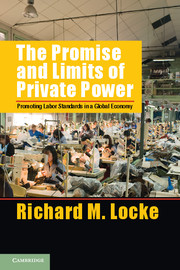Book contents
- Frontmatter
- Contents
- Acknowledgments
- 1 The Rise of Private Voluntary Regulation in a Global Economy
- 2 The Promise and Perils of Private Compliance Programs
- 3 Does Private Compliance Improve Labor Standards?
- 4 Capability Building and Its Limitations
- 5 Alternative Approaches to Capability Building
- 6 Are We Looking in The Wrong Place?
- 7 Complements or Substitutes?
- Conclusion
- Bibliography
- Index
- References
7 - Complements or Substitutes?
Private Power, Public Regulation, and the Enforcement of Labor Standards in Global Supply Chains
Published online by Cambridge University Press: 05 May 2013
- Frontmatter
- Contents
- Acknowledgments
- 1 The Rise of Private Voluntary Regulation in a Global Economy
- 2 The Promise and Perils of Private Compliance Programs
- 3 Does Private Compliance Improve Labor Standards?
- 4 Capability Building and Its Limitations
- 5 Alternative Approaches to Capability Building
- 6 Are We Looking in The Wrong Place?
- 7 Complements or Substitutes?
- Conclusion
- Bibliography
- Index
- References
Summary
Introduction
The previous chapters of this book have described both the promise and the limitations of various private efforts aimed at improving working conditions and promoting labor standards in global supply chains. Although corporate compliance programs were able to promote workplace improvements on some issues and among some suppliers, labor rights and working conditions stagnated or even deteriorated among other suppliers. Likewise, capability-building efforts by global brands, nongovernmental organizations (NGOs), and even the International Labor Organization were able to enhance the technical and managerial skills of factories participating in these various programs. But their impact on working hours, wages, and “enabling rights” was mixed. The previous chapter underscored the limitations of these private initiatives by showing how many workplace problems are the result not (or not solely) of misguided or unethical attitudes and behaviors by factory managers (hence, requiring ever-more-rigorous monitoring) nor even their poor managerial and technical skills (thus necessitating capability-building efforts); they are also the product of various upstream business practices by large retailers and global buyers that generate negative consequences downstream, among their suppliers. Until these practices among key actors within global supply chains are reformed, workplace-focused efforts aimed at improving working conditions and labor standards within global supply chains will always produce limited results.
- Type
- Chapter
- Information
- The Promise and Limits of Private PowerPromoting Labor Standards in a Global Economy, pp. 156 - 173Publisher: Cambridge University PressPrint publication year: 2013

